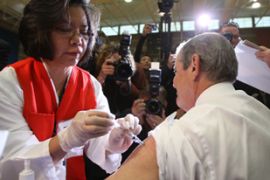US health bill clears first hurdle
Democrats vote to open crucial debate on healthcare reform bill in the US senate.

Days of uncertainty
Democrats Blanche Lincoln and Mary Landrieu ended days of uncertainty on Saturday and said they would vote to begin debate, giving Democrats the 60 votes they need to open the debate.
| in depth | |||||||||||||
|
“Although I don’t agree with everything in this bill, I have concluded that I believe that it is more important that we begin this debate to improve our nation’s healthcare system for all Americans …,” Lincoln said.
Landrieu said she wanted changes to make healthcare more affordable.
“It is a vote to move forward to continue the good and essential and important and imperative work that is underway,” she said.
Earlier this month, the House of Representatives, the country’s lower house of congress, narrowly approved the $1.1 trillion measure after hours of debate.
But senate Democrats need all their 60 senators to back the bill if it is to pass the 100-seat body, where it is facing Republican opposition.
Debate on the bill could last at least three weeks, after which, if passed, senators would reconcile the bill with the House of Representatives version and vote to send it to Barack Obama, the US president.
Republican opposition
Republicans have been united in their opposition to the bill and have said that, if it was passed, it would open the door for an expensive government takeover of healthcare.
The bill stipulates that all Americans have to obtain health insurance and creates a government-backed insurance plan, popularly known as a “public option”.
It would bar insurers from excluding people for so called pre-existing conditions and for charging more based on medical history.
Most employers would have to offer coverage to their workers – though some small businesses would be exempt and the government would offer subsidies.
The US is the only industrialised democracy that does not ensure that all of its citizens have healthcare coverage.
However, Washington spends vastly more on healthcare – both per person and as a share of national income as measured by gross domestic product – than other industrialised democracies.
